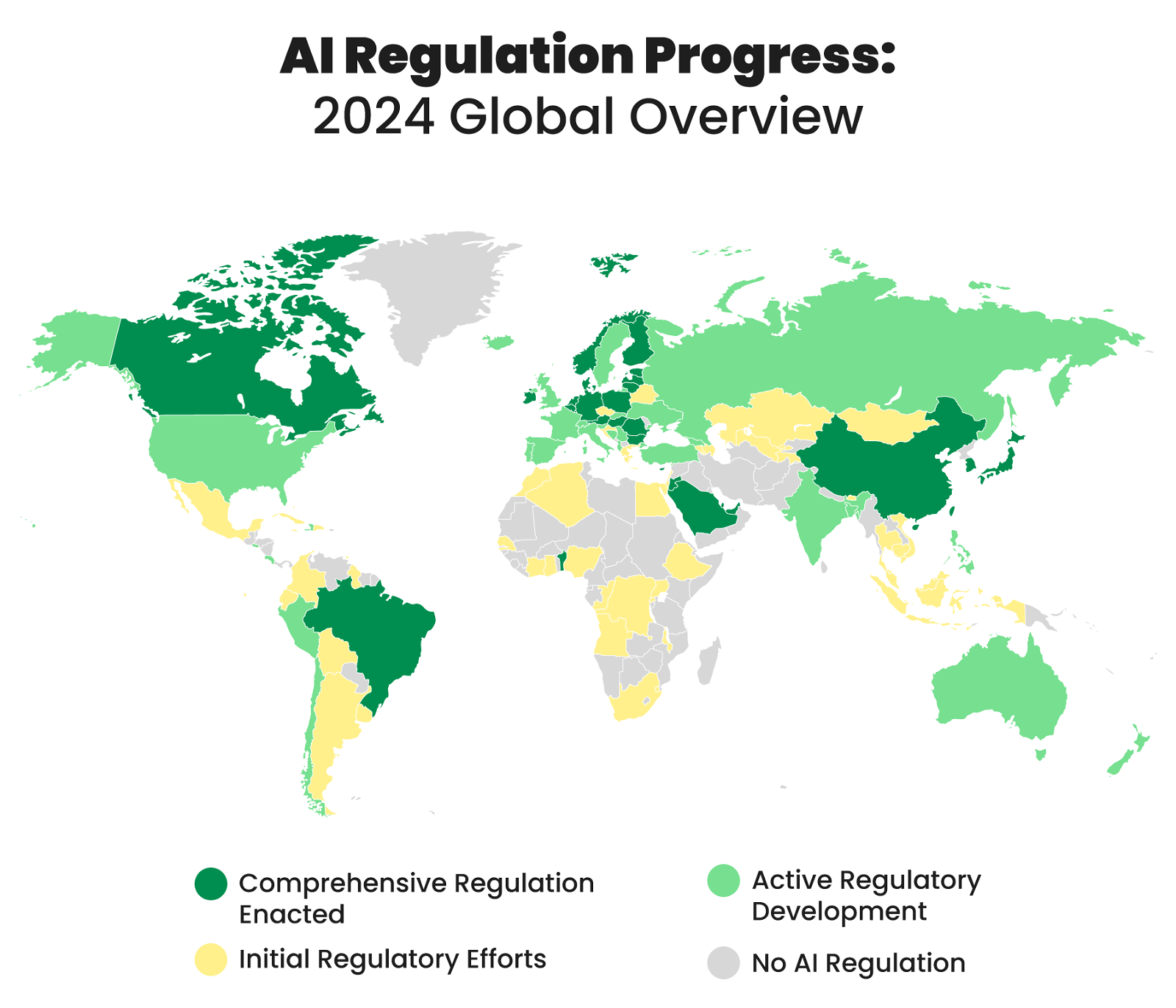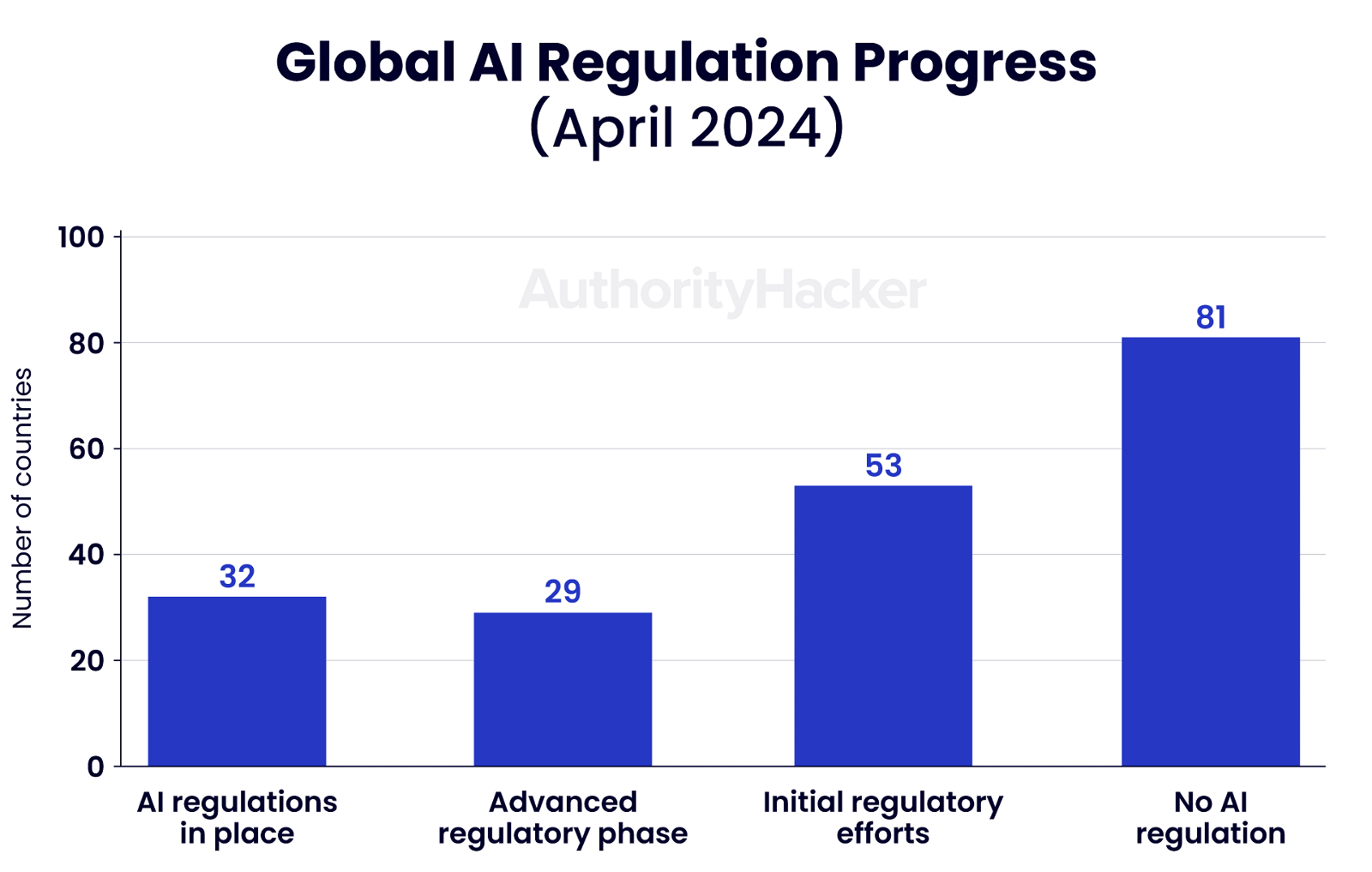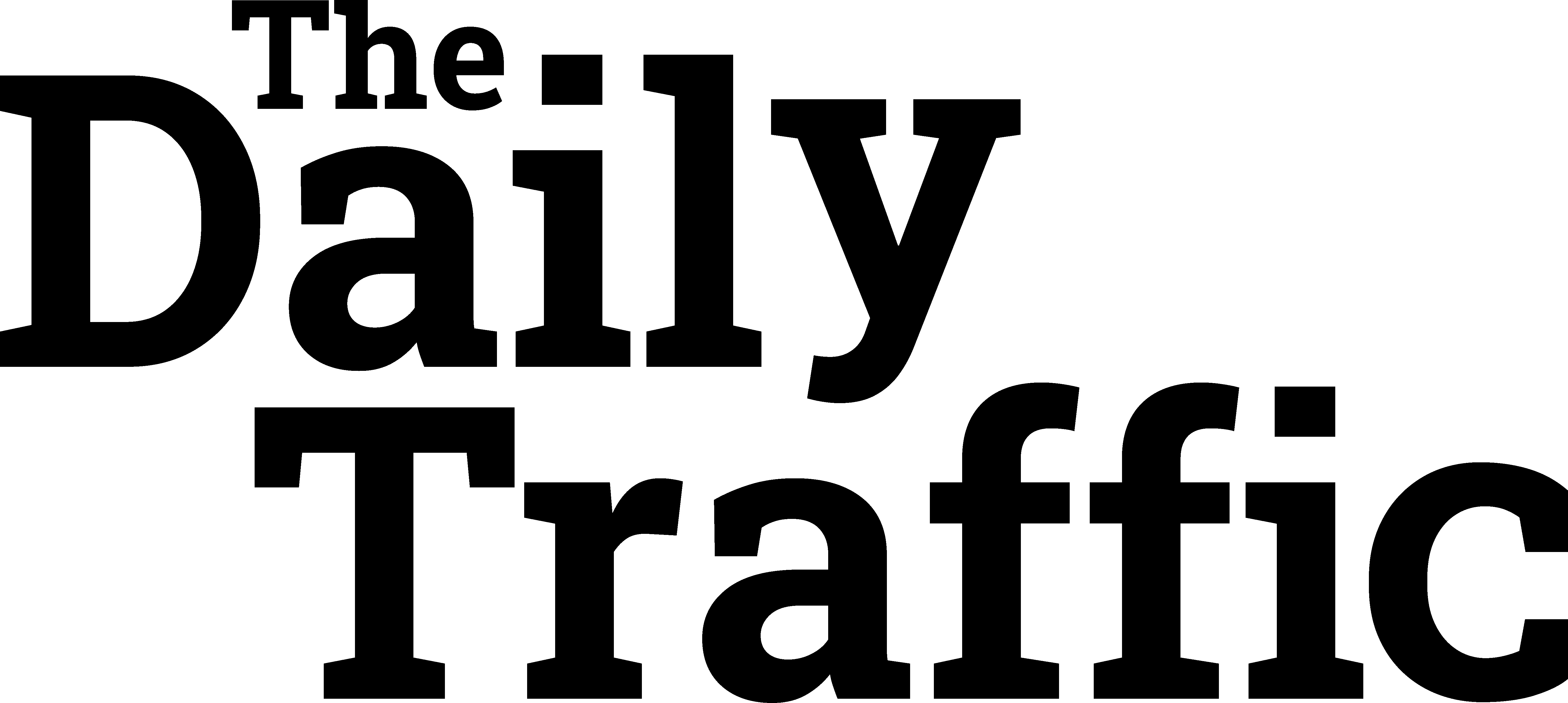Originally Posted on AuthorityHacker by Mark Webster
The rapid proliferation of AI has brought about new and concerning dangers. In an attempt to mitigate the harmful aspects of AI, governments worldwide are responding with various laws and regulations.
To understand the public’s concerns and expectations about governmental AI regulation, we surveyed 2,000 US residents and performed an in-depth analysis of the regulatory landscape across 195 countries.
By examining the effectiveness of current measures and gauging the desire for stricter regulations, our research seeks to provide valuable insights that can inform policymakers, industry leaders, and the public as we navigate this uncharted territory.
Why We Conducted This Study
We performed this research to understand two things:
- How governments are progressing with AI regulations
- How the public wants governments to react to the growing perils of AI
This survey is in response to the growing risks of AI.
Some perils are already occurring – such as using AI to scam people, create inappropriate deepfakes, and spread disinformation – while other potential threats lay on the horizon, including widespread job loss, autonomous weapons, and uncontrollable self-aware AI.
As a result, calls for governmental regulation of AI have come from many sectors – including leaders in AI development.
OpenAI CEO Sam Altman said of AI, “I think if this technology goes wrong, it can go quite wrong… We want to work with the government to prevent that from happening.” And Meta CEO Mark Zuckerberg said, “Congress should engage with AI to support innovation and safeguards.”
Governments have responded with varying degrees of urgency.
The European Parliament is leading the charge with their recent passage of the AI Act – the world’s first major set of regulatory ground rules to govern artificial intelligence.
The UN, led by the United States, adopted its first resolution on AI shortly after, though President Biden is yet to make progress in Congress despite pushing for regulations.
This environment of fear, uncertainty, and disjointed government response prompted us to investigate how US residents feel about governmental regulation of AI.
Most Americans Want Strict AI Regulations
Our survey revealed a significant level of concern and a desire for stricter AI regulations.
A striking 79.8% of respondents believed governments should implement strict AI regulations, even if it means slowing down technological innovation. This highlights the public’s prioritization of safety and ethical considerations over rapid advancement.
When asked about the effectiveness of current regulatory frameworks in managing AI risks, 55.5% of respondents considered them effective, with only 14.55% regarding them as “very effective.” This suggests that while some progress has been made, there is still room for improvement in the eyes of the public.
Furthermore, 82.3% of respondents expressed support for either international standards (41.35%) or a mix of international standards and local laws (40.95%) in AI regulation, emphasizing the need for a coordinated global approach.
Privacy emerged as a major concern, with 82.45% of respondents expressing unease about the use of personal data in training AI systems. This figure rose to an alarming 91.96% among respondents in the IT and software industries, with 48.28% indicating the highest level of concern. This underscores the urgent need for robust data protection measures and transparency in AI development.
Lastly, an overwhelming 83.9% of respondents believed that AI companies should pay royalties for copyrighted content used in training AI models. This sentiment reflects the growing debate around intellectual property rights and reveals a desire for creators to receive fair compensation in the age of AI.
AI Regulation Analysis – Current State of the World
Our analysis reveals that nearly two-thirds of the world’s countries are actively working on regulating AI, with differing levels of progress.

To categorize countries’ progress on AI regulation, we developed a four-tier system:
- Comprehensive Regulation Enacted: Countries that have fully developed, enacted, and implemented comprehensive AI regulations. These regulations are broad, covering ethical concerns, privacy, transparency, security, and the societal impact of AI. This level signifies the highest degree of regulatory development.
- Active Regulatory Development: Countries with legislation in progress or those with frameworks or guidelines established. It includes nations actively working towards creating, revising, or finalizing AI-specific laws, as well as those that have set non-binding principles, frameworks, or guidelines to guide AI development and use.
- Initial Regulatory Efforts: Countries that have recognized the need for AI regulation and have begun preliminary efforts, such as research, stakeholder consultations, or the formation of advisory committees. This category highlights an early stage of engagement without substantial legal or formal guidelines.
- No AI Regulation: Countries that have not made discernible efforts towards AI regulation, either due to a lack of action, absence of information, or reliance solely on existing laws that do not specifically address AI.
Of 195 countries, 32 have already enacted comprehensive AI regulations, while 29 are actively working on implementing and finalizing laws. 53 countries are in the initial or drafting stages of their own AI-related regulations.

The European Union and China have taken the lead in AI regulation, albeit with different objectives.
The EU’s AI Act prioritizes minimizing social harms through a comprehensive, risk-based approach, while China’s regulations focus on reasserting state control over information.
Neither approach is likely to favor AI innovation, presenting a challenge for other nations to develop their own unique strategies that balance innovation, safety, and ethical considerations.
The United States and the United Kingdom are currently in the stage of active regulatory development.
The UK government plans on targeted legislative interventions to address gaps in the current regulatory landscape, particularly concerning complex general-purpose AI systems.
In the US, President Biden issued a landmark Executive Order to protect Americans from the potential risks of AI systems.
However, a broader US response hasn’t come to fruition. While some US agencies have completed short-term actions and advanced longer-term directives, the progress of proposed bills in Congress remains uncertain.
Implications of Study
Our survey results show that Americans want strict, comprehensive, and globally coordinated AI regulations. Policymakers and industry leaders must address these concerns and create frameworks that ensure safety, privacy, and ethics while still allowing for innovation.
Our analysis of current AI regulations found that progress is being made, but much work remains. Only 32 out of 195 countries have comprehensive AI laws, meaning most nations are just starting to tackle this critical issue. The lack of a unified global approach makes it hard to ensure consistent standards and reduce risks.
The study also underscores the need for international collaboration in AI regulation. As AI crosses borders, countries must work together to establish global standards and best practices. This requires open communication, sharing knowledge, and a commitment to addressing AI challenges cooperatively.
AI Regulation Findings: Country-By-Country
Here are our complete findings from our analysis of 195 countries:
| Country | AI Regulation Status | More Information |
|---|---|---|
| Andorra | Comprehensive Regulation Enacted | EU’s comprehensive AI law known as the Artificial Intelligence Act. |
| Austria | Comprehensive Regulation Enacted | Comprehensive AI strategy aiming for human-centric AI. |
| Belgium | Comprehensive Regulation Enacted | National AI strategy focusing on technological impact, social and economic benefits, and ethical aspects. |
| Benin | Comprehensive Regulation Enacted | Adopted a national strategy for AI and megadata. |
| Brazil | Comprehensive Regulation Enacted | Comprehensive legal framework for AI, including LGPD and the National AI Strategy. |
| Bulgaria | Comprehensive Regulation Enacted | National AI strategy focusing on infrastructure, research capacity, and building trust in society. |
| Canada | Comprehensive Regulation Enacted | Introduced the Artificial Intelligence and Data Act (AIDA), focusing on preventing harm and biased outputs. |
| China | Comprehensive Regulation Enacted | Interim Measures for the Management of Generative AI Services, shaping multilateral AI governance frameworks. |
| Cyprus | Comprehensive Regulation Enacted | National AI strategy approved by the Council of Ministers, focusing on talent, research, and ethical AI. |
| Denmark | Comprehensive Regulation Enacted | Published its national AI strategy focusing on economic growth and responsible AI development. |
| Estonia | Comprehensive Regulation Enacted | Over 80 AI use-cases in government, approved its second national AI strategy with significant investment. |
| Finland | Comprehensive Regulation Enacted | Over 80 AI use-cases in government, approved its second national AI strategy focusing on societal challenges. |
| Germany | Comprehensive Regulation Enacted | Developed a comprehensive national AI strategy, ratified the EU AI Act. |
| Hungary | Comprehensive Regulation Enacted | Developed its National AI Strategy focusing on various aspects including education and regulatory frameworks. |
| Ireland | Comprehensive Regulation Enacted | Developed National AI Strategy including an AI Standards & Assurance Roadmap, aligning with the EU AI Act. |
| Japan | Comprehensive Regulation Enacted | Actively regulating AI, including guidelines for AI ethics and safety. |
| Jordan | Comprehensive Regulation Enacted | Developed an AI Strategy and Implementation Roadmap for 2023-2027, focusing on capacity-building and scientific research. |
| Latvia | Comprehensive Regulation Enacted | National AI strategy aiming to promote AI uptake and growth, focusing on education and legal frameworks. |
| Liechtenstein | Comprehensive Regulation Enacted | Implemented comprehensive AI regulations including the Liechtenstein Blockchain Act. |
| Lithuania | Comprehensive Regulation Enacted | Developed National AI Strategy focusing on research, education, innovation, and ethical AI deployment. |
| Luxembourg | Comprehensive Regulation Enacted | National AI Strategy aiming to position the country as a leading digital society, focusing on research and ethical framework. |
| Malta | Comprehensive Regulation Enacted | National AI Strategy aiming for leadership in AI, focusing on investment, innovation, and adoption. |
| Monaco | Comprehensive Regulation Enacted | Implemented UNESCO recommendations on AI ethics, focusing on ethical AI deployment. |
| Netherlands | Comprehensive Regulation Enacted | Analyzed the EU draft AI Act and its overlap with existing regulations. |
| Norway | Comprehensive Regulation Enacted | National Strategy for Artificial Intelligence focusing on ethical principles. |
| Poland | Comprehensive Regulation Enacted | Adopted its national AI strategy “AI Poland 2030” focusing on education and specialization. |
| Qatar | Comprehensive Regulation Enacted | Qatar has enacted a National Artificial Intelligence Strategy. |
| Romania | Comprehensive Regulation Enacted | National Strategic Framework for Artificial Intelligence focusing on reliable infrastructure and trustworthy AI. |
| Saudi Arabia | Comprehensive Regulation Enacted | National Strategy for Artificial Intelligence focusing on research, innovation, and ethical AI adoption. |
| Singapore | Comprehensive Regulation Enacted | Singapore has launched a National Artificial Intelligence Strategy, aiming to establish Singapore as a leader in developing and deploying scalable, impactful AI solutions. |
| South Korea | Comprehensive Regulation Enacted | Developed and enacted comprehensive AI regulations, expected to take effect soon. |
| United Arab Emirates (UAE) | Comprehensive Regulation Enacted | AI Strategy 2031 aims to become a world leader in AI, aligning with UAE Centennial 2071. |
| Albania | Active Regulatory Development | EU accession negotiations with Albania includes discussions on AI regulations. |
| Australia | Active Regulatory Development | Intention to regulate AI, considering AI risk classifications. |
| Bangladesh | Active Regulatory Development | Developing national AI strategy for social and economic growth. |
| Bosnia and Herzegovina | Active Regulatory Development | Progress toward EU accession, European Commission recommends opening EU accession negotiations. |
| Chile | Active Regulatory Development | Discussing a Bill for incorporating legal and ethical considerations into AI development. |
| Costa Rica | Active Regulatory Development | Legislators introduced a bill to regulate AI, emphasizing transparency, privacy, and data security. |
| El Salvador | Active Regulatory Development | Passed a bill exempting AI companies from certain taxes to attract tech companies. |
| France | Active Regulatory Development | Agreed to ratify the EU’s AI Act, marking a breakthrough in the regulation of AI technologies in Europe. |
| Georgia | Active Regulatory Development | Debating specific AI legislation, recognizing the significance of AI. |
| Haiti | Active Regulatory Development | Facing political challenges, but EU approved comprehensive AI legislation applies based on risk categories. |
| Iceland | Active Regulatory Development | Published its National AI Strategy focusing on AI ethics and societal challenges. |
| India | Active Regulatory Development | Oscillates between non-regulatory and cautious approaches, considering the Digital India Act for AI regulation. |
| Italy | Active Regulatory Development | Draft AI strategy focusing on education, research, ethical frameworks, and public services. |
| New Zealand | Active Regulatory Development | New Zealand has introduced its Model Artificial Intelligence Governance Framework and is partnering with the Centre for the Fourth Industrial Revolution. |
| Peru | Active Regulatory Development | Introduced a bill for AI use and regulation, focusing on ethical advancements. |
| Philippines | Active Regulatory Development | House Bill No. 7396 aims to promote the development and regulation of AI. |
| Portugal | Active Regulatory Development | Presented “AI Portugal 2030” to foster AI use in public and private sectors. |
| Russia | Active Regulatory Development | Implemented a special legal framework for AI in Moscow, with concerns on military AI due to brain drain. |
| Saint Kitts and Nevis | Active Regulatory Development | UNESCO Caribbean Artificial Intelligence Initiative which aims to develop a sub-regional strategy on the ethical, inclusive and humane use of AI in the Caribbean SIDS. |
| Serbia | Active Regulatory Development | Adopted Ethics Guidelines for AI, shaping its AI policy and governance framework. |
| Slovakia | Active Regulatory Development | Aiming to build a trustworthy AI ecosystem as part of its digital transformation strategy. |
| Slovenia | Active Regulatory Development | Developing a National Programme promoting AI development and use by 2025. |
| Spain | Active Regulatory Development | Prepared its market for EU AI regulation, aiming to finalize the AI Act. |
| Sweden | Active Regulatory Development | Proposed a Model AI Governance Framework for Generative AI. |
| Switzerland | Active Regulatory Development | Taking a cautious approach to AI regulations, likely to follow EU regulations. |
| Turkey | Active Regulatory Development | Turkey has proposed a National AI Strategy (2021-2025), focusing on research, talent development, education, ethics, standards, and infrastructure. |
| Ukraine | Active Regulatory Development | Leading AI innovators, supporting growth without over-regulation. |
| United Kingdom | Active Regulatory Development | Proposed a Model AI Governance Framework for Generative AI, leading in private investment in AI. |
| United States of America | Active Regulatory Development | Biden-Harris Administration strengthening AI safety, security, privacy, and civil rights. |
| Algeria | Initial Regulatory Efforts | National strategy on research and innovation in AI. |
| Angola | Initial Regulatory Efforts | Regulation on the Law on Video Surveillance, need for further AI regulation development. |
| Antigua and Barbuda | Initial Regulatory Efforts | Active work on AI strategies and policies, UNESCO Caribbean AI Initiative. |
| Argentina | Initial Regulatory Efforts | Lacks specific AI legislation but adheres to the UNESCO Recommendation on the Ethics of AI. |
| Armenia | Initial Regulatory Efforts | Active technology ecosystem, comprehensive national AI policies still evolving. |
| Azerbaijan | Initial Regulatory Efforts | Preparing legal framework for AI use, working on policies and initiatives. |
| Bahamas | Initial Regulatory Efforts | Data Protection Act addresses AI risks related to data privacy. |
| Bahrain | Initial Regulatory Efforts | Active work on AI strategy, focusing on economic growth using AI. |
| Barbados | Initial Regulatory Efforts | Hosted consultation on the draft Recommendation on the Ethics of AI. |
| Belarus | Initial Regulatory Efforts | Follows current legislation for AI activities, ESA-AI operates within legal framework. |
| Bhutan | Initial Regulatory Efforts | Recognizes AI’s potential for development, encouraging AI research labs. |
| Bolivia | Initial Regulatory Efforts | Exploring AI’s potential, specific regulations not yet established. |
| Brunei | Initial Regulatory Efforts | High rank in Government AI Readiness Index, focusing on data and infrastructure. |
| Cabo Verde | Initial Regulatory Efforts | Advancing digital development and connectivity, promoting Internet access and digital transformation. |
| Cambodia | Initial Regulatory Efforts | Embracing AI and digital transformation, interest in AI adoption across businesses. |
| Colombia | Initial Regulatory Efforts | Launched an Ethical Framework for AI, advancing in trustworthy AI development. |
| Congo (Congo-Brazzaville) | Initial Regulatory Efforts | ARCAI aims to advance research through AI with a human-centered approach. |
| Côte d’Ivoire | Initial Regulatory Efforts | Limited information on specific AI regulation, actively working on digital development. |
| Croatia | Initial Regulatory Efforts | Working on its national AI strategy, focusing on ethical, legal, and macro development aspects. |
| Cuba | Initial Regulatory Efforts | Scientific community with relevant AI research, developing a strategy for AI. |
| Czechia (Czech Republic) | Initial Regulatory Efforts | Actively working on AI governance, part of EU’s efforts to regulate AI. |
| Democratic Republic of the Congo | Initial Regulatory Efforts | Establishing the first African AI Research Centre, collaboration with UNIDO and ITU. |
| Dominican Republic | Initial Regulatory Efforts | Actively working on its AI strategy, aiming to exploit AI technologies for development. |
| Ecuador | Initial Regulatory Efforts | Recognizes AI’s potential in healthcare, security, and environmental protection, preparing with connectivity and tech. |
| Egypt | Initial Regulatory Efforts | Adapting to AI complexities, existing laws indirectly govern aspects of AI. |
| Eswatini (fmr. “Swaziland”) | Initial Regulatory Efforts | Finalizing a draft national AI policy to promote responsible and sustainable AI implementation. |
| Ethiopia | Initial Regulatory Efforts | Ministry finalizing a draft national AI policy to create an environment for AI innovation. |
| Ghana | Initial Regulatory Efforts | Debating the need for AI legislation, focusing on potential inequality and machine errors. |
| Greece | Initial Regulatory Efforts | Developing a comprehensive policy document to regulate AI use, focusing on ethical and cultural aspects. |
| Guyana | Initial Regulatory Efforts | Exploring the AI revolution, launching a national digital transformation strategy. |
| Holy See (Vatican) | Initial Regulatory Efforts | Released an AI ethics handbook in partnership with Santa Clara University. |
| Indonesia | Initial Regulatory Efforts | Evolving AI policies, National AI Strategy addressing challenges in various sectors. |
| Israel | Initial Regulatory Efforts | Unveiled a comprehensive policy on AI regulation and ethics, addressing challenges and fostering innovation. |
| Jamaica | Initial Regulatory Efforts | Forming an AI Task Force to develop a National AI Policy, recognizing the need for responsible innovation. |
| Kazakhstan | Initial Regulatory Efforts | Defining legal AI definitions, aiming to develop AI framework based on globally accepted approaches. |
| Lebanon | Initial Regulatory Efforts | Developing a national strategy on AI to safeguard fundamental rights. |
| Malawi | Initial Regulatory Efforts | Preparing to harness AI for development, existing policies like PDPA can serve as foundation. |
| Malaysia | Initial Regulatory Efforts | No specific AI regulations, relying on existing policies like PDPA for ethical AI use. |
| Mauritius | Initial Regulatory Efforts | Published an Artificial Intelligence Strategy, exploring AI adoption and aiming for a balance between innovation and regulation. |
| Mexico | Initial Regulatory Efforts | Lacks specific AI regulations, utilizing AI in various sectors. |
| Mongolia | Initial Regulatory Efforts | Receiving a boost in AI development, aiming to promote AI and marketing synergies. |
| Morocco | Initial Regulatory Efforts | Implementing UNESCO recommendations on AI ethics, working on AI development. |
| Nigeria | Initial Regulatory Efforts | General and sector-specific laws apply, with data privacy relevant for AI. |
| Rwanda | Initial Regulatory Efforts | Launched Caribbean Artificial Intelligence Initiative for ethical and inclusive use of AI. |
| Senegal | Initial Regulatory Efforts | Working on AI governance, part of the global conversation on regulating AI. |
| South Africa | Initial Regulatory Efforts | South Africa has not yet formalized any policy documents or entered bills to parliament for the regulation of AI. However, the country has appointed a Presidential Commission on the Fourth Industrial Revolution (4IR) to position South Africa as a competitive global player in the digital industrial revolution. |
| Tajikistan | Initial Regulatory Efforts | Aiming for 1% of GDP from AI by 2026, forming an AI Council to contribute to long-term development. |
| Thailand | Initial Regulatory Efforts | Proposed Draft Royal Decree on Business Operations that Use Artificial Intelligence System. |
| Trinidad and Tobago | Initial Regulatory Efforts | Exploring ways to establish a dedicated task force for AI strategies and policies. |
| Uganda | Initial Regulatory Efforts | Presented a national roadmap for AI regulation, balancing innovation and security. |
| Uruguay | Initial Regulatory Efforts | Substantial progress in AI readiness, developing an AI Strategy for the Digital Government. |
| Uzbekistan | Initial Regulatory Efforts | Establishing an Artificial Intelligence Council to develop a National AI Strategy. |
| Vietnam | Initial Regulatory Efforts | Proposed National Strategy on AI (2021-2030). |
| Afghanistan | No AI Regulation | NATO Review’s article on An Artificial Intelligence Strategy for NATO outlines NATO’s approach to AI adoption and use. |
| Belize | No AI Regulation | No specific information on AI regulation. |
| Botswana | No AI Regulation | Open to AI’s potential for development, specifics not widely documented. |
| Burkina Faso | No AI Regulation | No specific information on AI regulation. |
| Burundi | No AI Regulation | No specific information on AI regulation. |
| Cameroon | No AI Regulation | No specific information on AI regulation. |
| Central African Republic | No AI Regulation | No specific information on AI regulation. |
| Chad | No AI Regulation | No specific information on AI regulation. |
| Comoros | No AI Regulation | No specific information on AI regulation. |
| Djibouti | No AI Regulation | No specific information on AI regulation. |
| Dominica | No AI Regulation | No specific information on AI regulation. |
| Equatorial Guinea | No AI Regulation | No specific information on AI regulation. |
| Eritrea | No AI Regulation | No specific information on AI regulation. |
| Fiji | No AI Regulation | No specific information on AI regulation. |
| Gabon | No AI Regulation | No specific information on AI regulation. |
| Gambia | No AI Regulation | No specific information on AI regulation. |
| Grenada | No AI Regulation | No specific information on AI regulation. |
| Guatemala | No AI Regulation | No specific information on AI regulation. |
| Guinea | No AI Regulation | No specific information on AI regulation. |
| Guinea-Bissau | No AI Regulation | No specific information on AI regulation. |
| Honduras | No AI Regulation | No specific information on AI regulation. |
| Iran | No AI Regulation | No specific information on AI regulation. |
| Iraq | No AI Regulation | No specific information on AI regulation. |
| Kenya | No AI Regulation | Relies on existing laws like the Data Protection Act of 2019 for AI-related issues. |
| Kiribati | No AI Regulation | No specific information on AI regulation. |
| Kuwait | No AI Regulation | No specific information on AI regulation. |
| Kyrgyzstan | No AI Regulation | No specific information on AI regulation. |
| Laos | No AI Regulation | No specific information on AI regulation. |
| Lesotho | No AI Regulation | No specific information on AI regulation. |
| Liberia | No AI Regulation | No specific information on AI regulation. |
| Libya | No AI Regulation | No specific information on AI regulation. |
| Madagascar | No AI Regulation | No specific information on AI regulation. |
| Maldives | No AI Regulation | No specific information on AI regulation. |
| Mali | No AI Regulation | No specific information on AI regulation. |
| Marshall Islands | No AI Regulation | No specific information on AI regulation. |
| Mauritania | No AI Regulation | No specific information on AI regulation. |
| Micronesia | No AI Regulation | No specific information on AI regulation. |
| Moldova | No AI Regulation | No specific information on AI regulation. |
| Montenegro | No AI Regulation | No specific information on AI regulation. |
| Mozambique | No AI Regulation | No specific information on AI regulation. |
| Myanmar (formerly Burma) | No AI Regulation | No specific information on AI regulation. |
| Namibia | No AI Regulation | No specific information on AI regulation. |
| Nauru | No AI Regulation | No specific information on AI regulation. |
| Nepal | No AI Regulation | No specific information on AI regulation. |
| Nicaragua | No AI Regulation | No specific information on AI regulation. |
| Niger | No AI Regulation | No specific information on AI regulation. |
| North Korea | No AI Regulation | No specific information on AI regulation. |
| North Macedonia | No AI Regulation | No specific information on AI regulation. |
| Oman | No AI Regulation | No specific information on AI regulation. |
| Pakistan | No AI Regulation | Existing laws address aspects related to AI and cybersecurity. |
| Palau | No AI Regulation | No specific information on AI regulation. |
| Palestine State | No AI Regulation | No specific information on AI regulation. |
| Panama | No AI Regulation | No specific information on AI regulation. |
| Papua New Guinea | No AI Regulation | No specific information on AI regulation. |
| Paraguay | No AI Regulation | No specific information on AI regulation. |
| Saint Lucia | No AI Regulation | No specific information on AI regulation. |
| Saint Vincent and the Grenadines | No AI Regulation | No specific information on AI regulation. |
| Samoa | No AI Regulation | No specific information on AI regulation. |
| San Marino | No AI Regulation | No specific information on AI regulation. |
| Sao Tome and Principe | No AI Regulation | No specific information on AI regulation. |
| Seychelles | No AI Regulation | No specific information on AI regulation. |
| Sierra Leone | No AI Regulation | No specific information on AI regulation. |
| Solomon Islands | No AI Regulation | No specific information on AI regulation. |
| Somalia | No AI Regulation | No specific information on AI regulation. |
| South Sudan | No AI Regulation | No specific information on AI regulation. |
| Sri Lanka | No AI Regulation | No specific information on AI regulation. |
| Sudan | No AI Regulation | No specific information on AI regulation. |
| Suriname | No AI Regulation | No specific information on AI regulation. |
| Syria | No AI Regulation | No specific information on AI regulation. |
| Tanzania | No AI Regulation | No specific information on AI regulation. |
| Timor-Leste | No AI Regulation | No specific information on AI regulation. |
| Togo | No AI Regulation | No specific information on AI regulation. |
| Tonga | No AI Regulation | No specific information on AI regulation. |
| Tunisia | No AI Regulation | No specific information on AI regulation. |
| Turkmenistan | No AI Regulation | No specific information on AI regulation. |
| Tuvalu | No AI Regulation | No specific information on AI regulation. |
| Vanuatu | No AI Regulation | No specific information on AI regulation. |
| Venezuela | No AI Regulation | No specific information on AI regulation. |
| Yemen | No AI Regulation | No specific information on AI regulation. |
| Zambia | No AI Regulation | No specific information on AI regulation. |
| Zimbabwe | No AI Regulation | No specific information on AI regulation. |
How did we get these numbers and data?
To gauge public sentiment on AI regulations, we conducted a survey of 2,000 individuals in the United States, aged 18-55. The survey focused on five key areas:
- Effectiveness of current AI regulations
- Need for stricter measures
- Importance of international standards
- Privacy concerns
- Royalties for copyrighted material used in AI training.
To categorize each country’s progress on AI regulation, we identified four categories of progress:
- Comprehensive Regulation Enacted
- Active Regulatory Development
- Initial Regulatory Efforts
- No AI Regulation
We then reviewed each country’s recent legislative achievements and upcoming priorities to see where each ranked in this framework.






